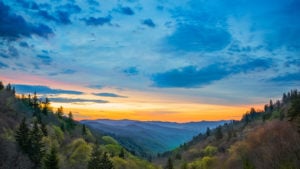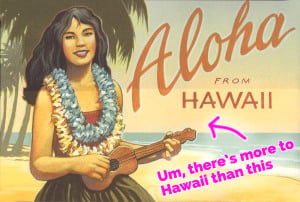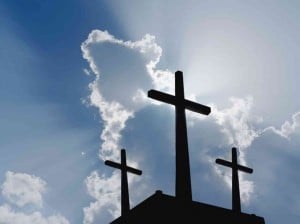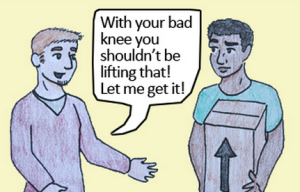Recently, public lands in the US have gotten a lot of attention.
After Inauguration Day, someone at the helm of the National Park Service’s Twitter account got a bit sassy. They shared a comparison of two photos, demonstrating the rather remarkable difference in attendance for Obama’s 2009 inauguration and the events this January.
Inaugurations take place at the National Mall in Washington, DC, which is, in fact, one of our national parks.
While clear evidence demonstrates that the crowd size was notably smaller for the recent celebration, the president and his press secretary insisted that such claims are simply the “biased” media inventing stories and trying to brainwash the public.
As the administration was brazenly and visibly lying to us all about what happened on land our tax dollars maintain, they also began removing any mention of climate change from government websites and issued orders preventing environmental agencies from communicating directly with the public – and punishing those that resisted.
While this – alongside a barrage of attacks on human and constitutional rights across the country – went on, the president announced plans to start drilling for oil in the Grand Tetons and the Everglades.
Then, Rep. Jason Chaffetz pulled a high profile bill soon after its introduction. The title of H.R. 621, “Disposal of Excess Federal Lands Act of 2017,” makes it sound like the federal government has a bunch of extra, useless tracts of land hanging off the sides of the country, and that we’d better get rid of them as fast as possible for everybody’s good.
What the bill actually aims to do is direct the secretary of the interior to transfer federal land across the western US to state governments.
Whether or not that sounds super threatening to you considering all of the other nefarious, aggressive, dehumanizing courses taken by the federal government in the past two weeks, you should know:
Something like this makes a lot of people who live in those states real mad. So folks from all over said something about it.
Threatening to sell federal lands – which aren’t so much “federal” lands in practice, but lands managed with federal money, held in trust by the federal government for the people of the US – threatens people across the political spectrum.
When it wasn’t just the usual crew of environmentalists and tribal leaders shouting at Congress, but anglers and hunters with conservative, moderate, and liberal politics as well, representatives noticed.
So why is public land such an intense, emotional issue in the West?
And why is it such a big deal to “sell-off” federal lands, or transfer them back to state control at a time when we have so many terrifying realities to deal with?
1. Conflicts of Private and Public Land Are an Intrinsic Part of Western America’s Identity
The creation of the US was a massive project in speculation.
From the 18th century through the end of the 19th century, mapmakers and surveyors carved up the vast swathes of land beyond the Mississippi river in property grids, erasing the knowledge, culture, and conceptions of property and ownership of the people who already lived there.
The federal government then empowered settlers to strike out and colonize the land, homestead by homestead, fighting and digging their way across the country.
As tribes were relegated to reservations, cattle ranchers, sheep herders, loggers, and pioneers all began to have conflicts over space and resources.
Although we still have stretches of miles and miles with only handfuls of people in every state in the West, our economies have long been constructed on extracting natural resources from the land. And those will always be limited.
If a ranch owner wants to use a section of forest land to graze their cattle, but the federal government is pressured to regulate how many cows can graze there because of the detriment to river ecosystems, the corporations or people who own those cows get angry. Same goes for logging or mining.
While simply selling off public federal lands to a private oil company might seem obviously egregious, transferring their ownership back to a state to control it might seem like a more reasonable idea.
But don’t be fooled.
Managing big pieces of land takes money and resources – things that state governments are often short on. So when states are faced with an enormous new expense and the opportunity to sell it at a profit to mining, logging, and drilling companies, what do you think they’ll do? The fall-out won’t be surprising, and it won’t be new.
Intricate ecosystems that took thousands of years to build will be trammeled in weeks. Earthmovers, oil derricks, and semi-trucks will dig up the places you used to fish, wander, and farm.
And the ruinous pollution that comes along with ruthless, profit-driven resource extraction will poison the water and air in communities of poor people and people of color more than anywhere else.
The march of settlers, extractors, users, and builders across the West displaced and killed millions of native people, and also enabled white supremacist arrangements of property-based hierarchy that extend into our world today.
Therefore, these tensions are not just something that matters to folks in the West, and they’re not something that’s only significant to people who care about the environment.
They’re essential to imagining a better, decolonized world, where the redistribution of wealth is possible.
2. This Allows States to Sell Land Stolen from Indigenous People to Private Corporations
You’re probably familiar with the years-long protest at Standing Rock over the construction of the Dakota Access Pipeline.
Halted in December under the waning days of the Obama administration, the new powers that grab have announced aggressive plans to complete the passionately protested, unpopular project.
Violent removal of Lakota and other tribal and non-native water protectors has already begun with 76 arrested recently, including the politician and attorney Chase Iron Eyes, and destruction of winter encampments is underway.
The protectors and activists around the country have used phrases like “Water is life” and “You can’t drink oil” to emphasize the abhorrent violence of threatening the water supply of an entire community.
And yet, it’s important to note that this struggle is about more than just oil, sustainability, and public health.
It’s about the newest attempt – in a series of attempts over the past 400 years – of a private corporation, with the blessing and support of a section of the US Government, to usurp tribal land rights, ignore treaties, threaten indigenous sacred sites, and potentially destroy artifacts.
Most of us are already living on occupied land. Politicians or land owners advocating for land sell-offs will try to claim that the federal government is “mismanaging” that land, and it should be sold off to a private corporation who wants to blow up the shale underground and drain it of oil in order to care for it properly – that is, make a profit.
This is a grave offense and danger to every worker and every individual who values autonomy– but it’s doubly violent to the indigenous people who already have the legal right to that land.
The failure to observe treaties over the past 250 years is already an audacious injustice.
But to suggest that we could ever move forward in recovering from white supremacist history of property expansion and land theft by selling off public space to corporations bent on creating profit should seem shocking.
The fact that it doesn’t demonstrate just how far we have to go, and how important the key of public land is in that journey.
3. There Is Nowhere People Can Sit Still for a Second and Not Have to Answer to Anybody
It’s not easy being queer, of color, disabled, trans, or non-conforming in any number of ways in this white supremacist, heteronormative, capitalist patriarchy we live in.
And while the ideas that nature is a totally separate, pure, wild place is complicated, it’s also fair to recognize that in the wilderness, the world looks different.
Stepping outside of roads, money, cars, banks, and buildings for a just an afternoon can be an immense relief. When I’m lost, flailing and depressed in the oppressive world that we live in, I can’t always see a way out. I fear that we will never escape the exploitative cycles that define our lives.
But when I sit by a river with my friends and my dog and build a quiet fire, I can start to imagine a world that operates very differently than this one does.
Simply being allowed to be somewhere, to exist without challenge or suspicion, is a privilege. And it should not be. It should be a right.
And since we don’t currently have that right in our communities and daily lives, we deserve the opportunity to visit a space – such as the protected spaces that already exists, like our natural parks – to access that right.
We deserve a place to escape when we’re emotionally exhausted from being tailed by security, pulled over by police, yelled at on the street, and questioned for our presence.
When we’re worn out from carefully talking down another racist at the bar or another white feminist yelling on Facebook about people being “divisive,” we should have the chance to go elsewhere, where we might quietly breathe unpolluted air, put our feet in mud and water, or stand under a thousand-year-old fir tree and look up.
We deserve the right to have moments where we only have to worry about the simplicities of survival in terms of our water filters and orienteering, rather than our likelihood of being murdered by our boyfriends or the cops.
Our public lands provide us the extraordinary chance to exist, momentarily, unharassed.
What if we lost that singular opportunity to have the right to take up space?
***
So, what are we supposed to do about it?
First, don’t be fooled by the potentially easy victory in the pulling of the bill I mentioned at the beginning of this article. There’s an even more destructive second bill, H.R. 622, coming right on its heels.
Stay vigilant, read between the lines, and never, ever trust the motives of people who want to sell off or transfer public land.
Keep calling your representatives about these issues specifically. Remember that “environmental” issues aren’t something that can be set aside because it feels like the immediate, bodily realities of people being detained in airports feels more suddenly important. It is important! All of it is.
But these lands are not just a big, abstract idea – they are tactile, tangible, material piece of our world, and our lives depend on them. Environmentalism isn’t just about not blowing up the literal Earth because we can’t imagine living another fifty years anyway.
It’s about social justice, the livelihood and flourishing of vulnerable people, and the imminent need to not let women and Indigenous people drown in polluted estuaries while the rest of us can scramble toward higher ground.
Just as the land we live on and walk on is physical, get ready, if you’re a person with a body that it’s possible to put at risk, to be physical in your resistance.
We must be willing to lay down on the ground in front of Earth movers and pipelines across this country. If we don’t, we will fail, and we will watch our world be dug up into a roiling pit of oil and set aflame.
It can’t just be radical activists and people who have no choice but to stand up in resistance anymore – we need everyone to shrug off fear and trepidation.
We must reframe who counts as our family, and we must toss respectability into the wind. Because this fight may come first for those on the margins, but it can’t be won with only the fringes.
[do_widget id=’text-101′]
Kimberly Fanshier is a Contributing Writer at Everyday Feminism. She’s a writer, activist, scholar, and queer feminist outlaw from the Willamette Valley. She is currently working on a book about the hidden histories of country music. Follow Kimberly Fanshier’s explorations of wolves, witches, and the west at her website or on Instagram @kimberlyfanshier. Read her articles here.
Search our 3000+ articles!
Read our articles about:
Our online racial justice training
Used by hundreds of universities, non-profits, and businesses.
Click to learn more





















